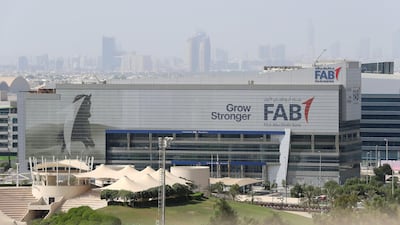Profits at First Abu Dhabi Bank (FAB), the UAE's biggest bank by assets, fell 3.5 per cent in 2017, impacted by lower revenues and merger-related costs, but came in ahead of most analyst forecasts.
FAB, formed from a merger between National Bank of Abu Dhabi and First Gulf Bank last April, said group net profit fell to Dh10.92 billion for the past year, down from Dh11.32bn reported for 2016. The full year net income figure came in above the Dh10.62bn mean estimate of analysts polled by Bloomberg, exceeding eight out of 10 predictions.
Adjusted 2017 group net income - excluding Dh600 million worth of integration costs and merger-related amortisation of intangibles - came in at Dh11.52bn. The bank said it had realised Dh500m in cost synergies in its first year of transition.
Full-year revenue, which was marginally below the analysts’ forecast, dropped by 4 per cent year-on-year to Dh19.53bn “amid softer market conditions and portfolio optimisation to enhance risk-adjusted returns”, the bank said.
“At the end of our first year, we have created significant value for our shareholders, customers and employees despite challenging market conditions,” said FAB chairman Sheikh Tahnoon bin Zayed Al Nahyan. “FAB’s 2017 financial results are a clear testament to the sound rationale behind the merger.”
_______________
Read more:
FAB says that third-quarter net profit slips 18 per cent amid drop in net interest income
ADCB, Mashreq 2017 net profits rise, but miss analysts' forecast
_______________
Banks in the Arabian Gulf region are recovering as the growth in loans gradually recovers, alongside a decrease in provisions required for troubled loans. The financial profiles of GCC banks are expected to stabilise by the second half of 2018 as they absorb the effect of softer economic conditions over the past two years, rating agency Standard & Poor’s said in a report released earlier this month.
FAB said that consumer deposits rose 4 per cent year on year to Dh395.8bn, while loans and advances fell 1 per cent to Dh330.5bn over the same period.
The bank’s board recommended a cash dividend of Dh0.70 per share, an 11 per cent jump from 2016, implying a total cash dividend of Dh7.6bn for 2017.
“FAB has moved significantly ahead in its integration journey and in a short period of time we have successfully delivered against many of the milestones that were set,” Abdulhamid Saeed, group chief executive officer of FAB said.
Moving forward, Mr Saeed said FAB is working on expanding presence to Saudi Arabia which forms part of its long-term strategy.
“We have also finalised our organisational structure and operating model, and integrated our policies and risk framework,” he said. FAB is also evaluating its activities and branch network locally, he added.


